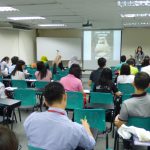An international student from Sudan, Mohamedali Elhag Mohamed Ahmed (in the photo above), ventured to Malaysia to pursue a degree in Pharmaceutical Chemistry at the International Medical University. As part of the programme, Mohamedali Elhag Mohamed Ahmed had the opportunity to undergo a 4-month internship at the National Cancer Society of Malaysia (NCSM) from November 2021 to March 2022. He tells us more about his internship experience in this interview.
| Why did you choose Pharmaceutical Chemistry? |
|---|
| To be honest the Pharmaceutical chemistry degree wasn’t my first choice for my undergraduate studies, perhaps I wanted to study Bachelor of Medicine. In fact, I have secured a place to study medicine in my home country. Before I accept the offer, I found myself passionate about drug discovery and development. I searched for a degree which will provide me with basic knowledge and skills to achieve my dream and I found out about the IMU Pharmaceutical Chemistry degree in Malaysia. The course covers different aspects of pharmaceutical industry including knowledge and technologies needed for drug discovery, design and chemical synthesis. I chose to study pharmaceutical chemistry to gain laboratory skills, problem solving skills, and basic pharmaceutical engineering skills. |
| Why did you choose IMU and what does IMU mean to you? |
| As International student I chose IMU because of the diverse student community. The university have international recognition and partnership with universities in United Kingdom and Australia which attracted me to study in IMU. The student life in the campus is very interesting, The lectures conducted are interactive while the lecturers are friendly and helpful. I recall the times during the preparation for end-of-semesters examination with my peers in library and quiet study area. The study area is well equipped with computers, printers and all utilities that students need. |
| As an international student, what would be the most inspirational moment in your study that motivates you? |
| Studying from home and attending classes online because of the COVID-19 outbreak was very challenging for me in the beginning. What motivates me to continue studying this course online is the effort that the lecturers put to deliver the best online learning experience. I believe it was a hard time for everyone during the pandemic however the lecturers did their best to keep us on track to graduate. During my studies I struggled to participate in lectures and to be active during the lectures, I overcome this problem by listening to recorded learning sessions and preparing my questions before I come to lectures or workshops. |
| Does the study in Pharmaceutical Chemistry help you to adapt to the internship programme/work-based learning? |
| I had the opportunity to do my internship in public health at the National Cancer Society of Malaysia. NCSM is the first not-for-profit cancer organisation in Malaysia that provides education, care and support services for people affected by cancer and the general public. I was attached to the Health and Education Literacy Department. When I started my internship at the National Cancer Society of Malaysia, I was wondering how the Pharmaceutical Chemistry programme can help me adapt to the working environment at NCSM. Due to the pandemic, the organisation has been focusing on projects related to vaccine administration and vaccine promotion. In the Pharmaceutics module, we were taught key laboratory skills which had helped me tremendously when I needed to complete tasks related to COVID-19 vaccine administration and dilution. The communication skills I learnt during Problem-Based Learning (PBL) sessions and day-to-day communication with my friends helped me to communicate effectively with patients from different backgrounds. |
| What have you learnt during internship? |
| I improved my technical and interpersonal skills during the internship at the Health Education and Literacy Department at NCSM. The learning experiences and technical skills that I have learnt during my study in IMU helped me in the assigned tasks: data entry, preparing Powerpoint slides, operating new medical devices, and learning new softwares quickly. Communication skills is one of the most important skills that I had improved during my internship. It was challenging to communicate with patients from different cultural backgrounds and different age groups. I had the opportunity to obtain hands-on experience in communicating with patients form different countries and assist in vaccinating them. I learnt basic Malay language and I noticed that the patients were very happy when I start talking with them in Malay. |
| Any challenges during internship and how you have overcome it? |
| Indeed, language was a barrier for me because majority of the patients doesn’t speak English. To overcome the language barrier my colleagues at work helped me to learn basic phrases and words and how to use those phrases and words in daily conversations. I managed to write a script in Malay language for calling an individual, checking their health condition and asking them if they are interested to receive the COVID-19 vaccine. |
| Any inspirational moment/event in your internship that motivates you? |
| Receiving constructive feedback frequently from my mentor at work motivated me and the feedback were used to identify my area of weaknesses. The feedback helped me to improve myself and to not to take things in the workplace personally. Overall, this internship was a great experience for me to learn how to manage time effectively, adapt to changes easily, and to cooperate with my team as much as I can. My advice to the juniors preparing for the internship is to not limit yourself to lab-based internship perhaps you should explore non-lab based and overseas internship opportunities to polish up on your communication and teamwork skills. Performing non-lab-based internship helped me to improve my soft skills to prepare me for my future career in Public Health. |
| What are your plans for future? |
| The internship stint has sparked my interest to start my career in the field of public health and health education; specially in the area of epidemiology management, which is to use effective management resources to maintain and promote the health of populations. |
We would want to thank Mohamedali Elhag Mohamed Ahmed for allocating some time for this interview.









